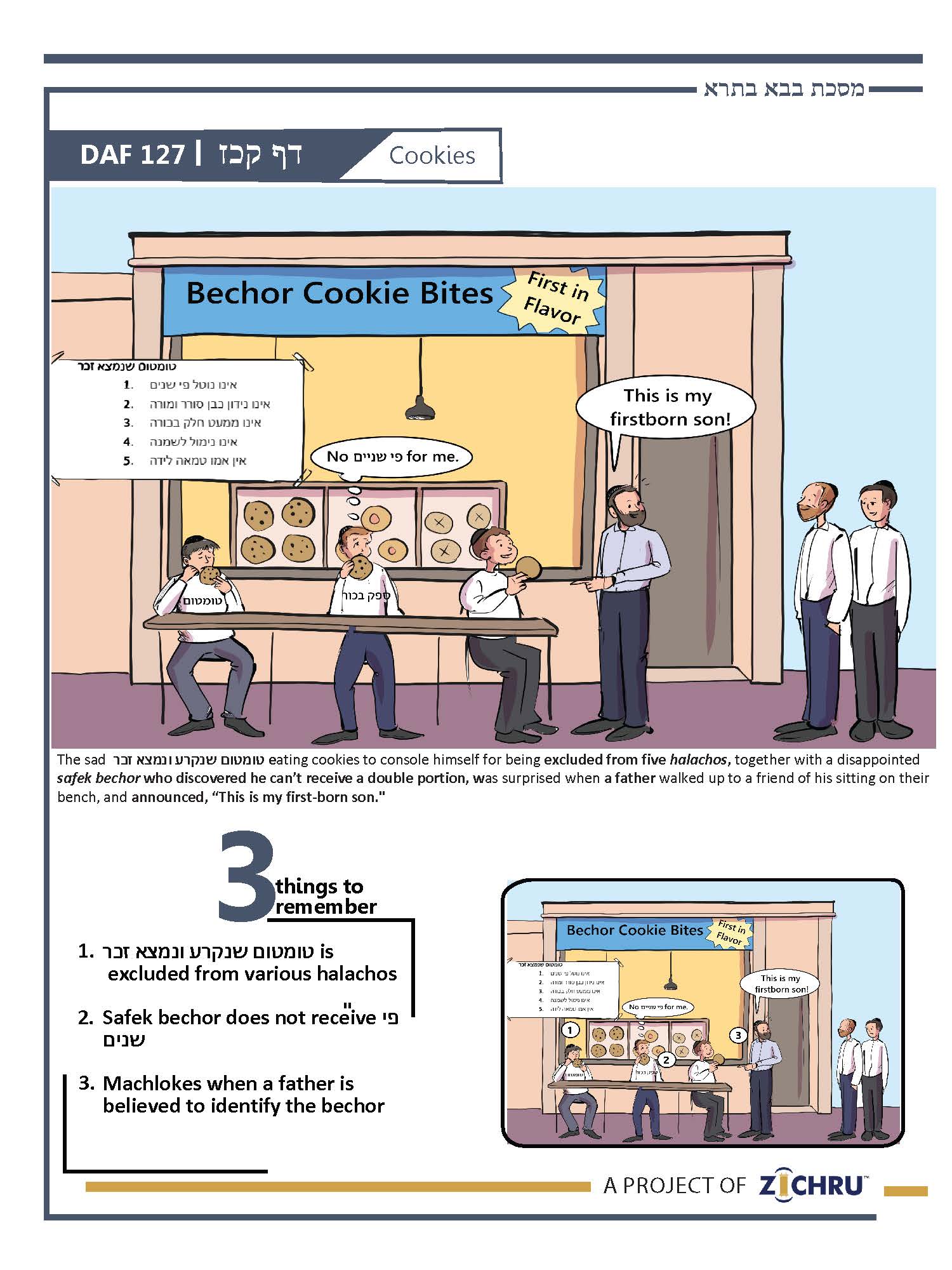- Audio Timestamps
0:00 - The 3 Sugyos
3:13 - Review of 3 Sugyos
6:13- Siman
8:14 - 4 Blatt Back Chazarah
116:17 - Pop Quiz (Last 7 blatt)
For access to all Zichru resources including PDFs, and illustrations CLICK HERE
- טומטום שנקרע ונמצא זכר is excluded from various halachos, such as בכורה
The Gemara teaches five laws which exclude טומטום שנקרע ונמצא זכר – tumtum whose covering was torn off and he was found to be a male. (1) אינו נוטל פי שנים – He does not take a double portion of his father’s property, even if he was the firstborn. (2) He is not subject to the law of בן סורה ומורה – a wayward and rebellious son. (3) אינו ממעט חלק בכורה – He does not reduce the bechor’s extra portion. The bechor’s portion is calculated as if he does not exist, and the remainder is divided equally among all the brothers. (4) Rav Shizvi says he is not circumcised on the eighth day if it is Shabbos. (5) Rav Sheravya says his mother does not become tamei from his childbirth. This last ruling is refuted from a Mishnah teaching that a woman who miscarries a טומטום must observe the stringencies of a male and female birth (i.e., fourteen tamei days, and a tahor period only until forty days). This does not refute Rav Shizvi’s ruling, although it is based on the same passuk, because it is possible that the Tanna is uncertain about excluding a טומטום.
- Two infants, one of whom is the bechor, but it is not known which
A Baraisa darshens: "בכור" ולא ספק – the passuk says “firstborn,” teaching the double portion is not given to a doubtful bechor. This means to exclude from Rava’s ruling: שתי נשים שילדו ב' זכרים במחבא – two wives of one man who gave birth in hiding, and it is therefore unknown which is the bechor, כותבין הרשאה זה לזה – they may write for each other a [document empowering the other to collect on his behalf], to be able to collect the extra portion. The above Baraisa teaches that since the bechor’s identity was unknown, he is not entitled to the extra portion at all. Rav Pappa told Rava that Ravin sent a ruling from Rebbe Yannai: הוכרו ולבסוף נתערבו – if [the infants] were originally recognized and later became mixed (i.e., the bechor’s identity was initially known, but later the two were confused), they may write a הרשאה for each other. Since his identity was once known, the bechor is entitled to a double portion. לא הוכרו – But if they were not ever recognized, they cannot write a הרשאה for each other, because the bechor is not entitled to a double portion. Rava had his error announced publicly and corrected it.
- יכיר: Machlokes when a father is believed to identify the bechor
A Baraisa darshens the word "יכיר" – he shall recognize (his firstborn son) to teach: יכירנו לאחרים – he can identify him to others. From here Rebbe Yehudah said: נאמן אדם לומר זה בני בכור – a person is believed to say, “This is my firstborn son,” even when it was presumed otherwise. Similarly, he is also believed to identify his son as a חלל. The Chachomim say he cannot identify his bechor against a presumption, nor disqualify his son. Rava explains that they derive from "יכיר" that a father can identify his firstborn son בצריך היכרא – where identification is needed (i.e., there is no presumed bechor). Although it seems obvious that a father is believed (to entitle him to a double portion of inheritance), since he could simply give him any of his possessions as a gift, a pasuk is needed for possessions he obtains after his identification (which he could not give as a gift). According to Rebbe Meir, who holds one may even transfer possessions he later acquires, the pasuk is needed for possessions he acquires as a גוסס – dying man, when he is incapable of transferring them.
Siman – CookiesThe sad טומטום שנקרע ונמצא זכר eating cookies to console himself for being excluded from five halachos, together with a disappointed safek bechor who discovered he can’t receive a double portion, was surprised when a father walked up to a friend of his sitting on their bench, and announced, “This is my first-born son.”







